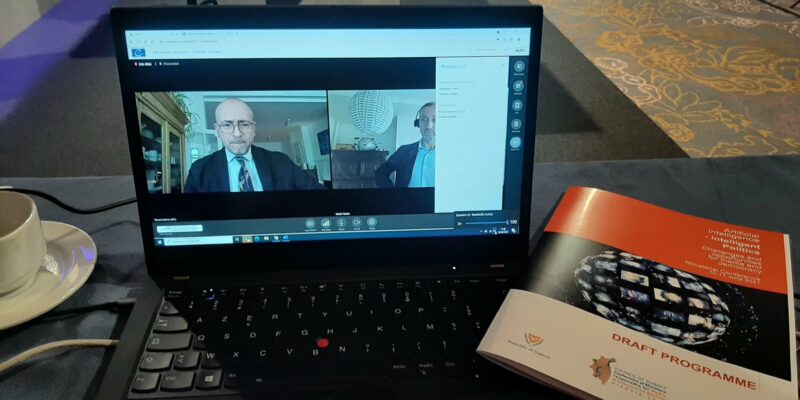EFJ calls on politicians to stop undermining journalists’ credibility

The General Secretary of the European Federation of Journalists (EFJ), Ricardo Gutiérrez, was invited today to speak about the situation of journalists at the Council of Europe Ministerial Conference on Artificial Intelligence, Freedom of Expression and Media Freedom. The EFJ again called on Council of Europe member states to fulfil their international commitments to protect journalists.
“All over Europe, media freedom is declining,” said Gutiérrez.” All over Europe, the working conditions of journalists are deteriorating. (…) The situation is getting worse, year after year. In the last six years, 33 journalists have been killed in Europe while doing their job. (…) We still have in Europe 38 ongoing cases of impunity for murders of journalists.”
The EFJ GS mentioned the threats highlighted in the background paper prepared by professor Damian Tambini for the conference (“Media Freedom, Regulation and Trust: A Systemic Approach to Information Disorder”):
- the shift of media consumption onto online platforms that people trust less;
- the global decline of trust in all media (not just the platforms);
- the lack of accountability structures and ethical self-regulation of online platforms;
- the temptation for states to establish new forms of regulation that may undermine media freedom and trust in democracy.
“Professional media do not need new regulation,” reacted Gutiérrez. “You all know the best antidotes to information disorders:
- protecting journalism as a public good;
- promoting media literacy;
- promoting ethics and self-regulation;
- promoting media pluralism;
- and above all, demanding much more transparency from those in power.”
The EFJ GS called on member states to promote effective implementation of the CoE Recommendation 2016/4 on the protection of journalism and safety of journalists and other media actors. “Member states should facilitate reforms of laws and practices, including national security, defamation and access to information provisions, ensuring full participation by independent media, journalists’ organisations and civil society stakeholders.”
Ricardo Gutiérrez also called on Member states “to enact laws and institutional safeguards to prosecute online abuse against journalists. Member states should take particular care to counter targeted abuse against female journalists.”
“Recommendation 2016/4 is a global model,” said Gutiérrez. “It is the most ambitious and integrated model of standards on a global scale. It is regrettable that so few governments have implemented these concrete measures to support press freedom. It is regrettable that some states are doing the opposite. They signed the Recommendation in 2016 and they are now demonstrating their hypocrisy by acting contrary to the recommendations they signed up to.”
Ricardo Gutiérrez mentioned the recent online attack from Slovenia Prime Minister Janez Janša against COE Commissioner for Human Rights Dunja Mijatović. “Some Slovenian politicians are constantly trying to undermine journalists’ credibility, accusing them of lying, and using offensive hashtags such as #fakenews. (…) Our affiliates, all over Europe, noticed a worrying surge in online abuse and threats against journalists, fuelled by politicians. Female journalists were especially targeted. (…) We reported cases involving politicians, including ministers and heads of government, in Croatia, Bosnia & Herzegovina, North Macedonia, Serbia, Turkey, The United Kingdom, Bulgaria, Malta, Czech Republic, Poland, Italy, France, Estonia, Austria, Slovakia, etc. This rhetoric of hate against journalists must stop.”
“I am not calling for a new commitment. I am simply calling on the Member States to fulfil their own commitments,” concluded Gutiérrez. To restore trust in a climate of mistrust, politicians must start by respecting journalists and respecting their own commitments.”
.@Molenews1 rightfully calling out the hypocrisy of states who signed Recommendations on the protection of journalism and safety of journalists but act contrary to their commitments#COEminAImedia@EFJEUROPE @MediaFreedomEU https://t.co/CVATFGcxEn
— ECPMF (@ECPMF) June 10, 2021
This is saying it as it is: ‘fueled by politicians’. https://t.co/55SdMFlvVN
— Nicholas Karides (@NicholasKarides) June 10, 2021











